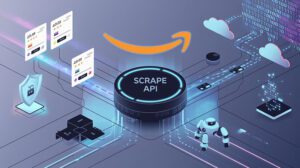With the acceleration of the digital economy, e-commerce platforms have accumulated invaluable big data resources. How enterprises and analysts effectively collect these data has become crucial for driving market research and improving the quality of business decisions. Among numerous data scraping methods, we have selected 10 classic and efficient technical means for extracting valuable data from e-commerce websites.
Python’s Requests Library: Directly Fetching Web Data
Python’s Requests library provides simple yet powerful HTTP request capabilities, making it easy to fetch web data. By sending HTTP requests, data can be directly retrieved from e-commerce websites, laying the foundation for subsequent analysis and processing.
Selenium Browser Simulation: Collecting Dynamically Loaded Data
For e-commerce websites that dynamically load data using JavaScript, Python’s Selenium library is a powerful tool. It can simulate real browser behavior, execute JavaScript code, and fetch dynamically loaded data, ensuring the completeness and accuracy of data scraping.
Scrapy Framework: Efficient Distributed Data Scraping
Scrapy is a powerful Python framework specifically designed for web crawling. Based on asynchronous IO and the Twisted framework, it can efficiently scrape data and support distributed deployment, enabling large-scale data crawling and processing.
Regular Expression Matching: Extracting Specific Data
Regular expressions are a powerful text matching tool used to extract data in specific formats. In e-commerce data scraping, regular expressions are often used to match and extract target data from web pages, offering flexibility and efficiency.
BeautifulSoup Parsing Library: Data Extraction
BeautifulSoup is a Python HTML and XML parsing library that can easily extract data from web documents. It provides a concise and intuitive API interface, making data extraction simple and fast, suitable for various e-commerce website data scraping tasks.
XPath Selector: Locating Data
XPath is a language used to locate nodes in XML documents, also commonly used for parsing and data extraction from HTML documents. By writing XPath selectors, data in web pages can be accurately located, achieving precise and efficient data scraping.
JSON Data Crawling: Fetching and Parsing JSON Data
Many e-commerce websites provide data interfaces that return JSON-formatted data. For such cases, Python’s json library can be used for data crawling and parsing, preparing the required e-commerce data for subsequent analysis and application.
API Interface Calling: Direct Data Retrieval
Some e-commerce platforms provide API interfaces that allow developers to directly retrieve data. By calling these API interfaces, data can be quickly and accurately obtained, avoiding the complexity of parsing web pages and improving the efficiency and reliability of data scraping.
Data Packet Capture Tool: Capturing Data Packets
Data packet capture tools can monitor network traffic and capture data packets from apps or websites. By analyzing data packets, requests and response data from e-commerce websites can be obtained, understanding the data interaction process of websites, assisting in data scraping and analysis work.
JavaScript Reverse Engineering: Extracting Encrypted Data
Some e-commerce websites use JavaScript obfuscation or encryption techniques, making data scraping difficult. In such cases, JavaScript reverse engineering can be employed to analyze the encryption algorithms on web pages, decrypt data, and accurately extract encrypted data.
Mastering these ten major techniques for e-commerce data scraping enables businesses and analysts to significantly enhance their ability to obtain information. However, among these methods, Pangolin Scrape API stands out, providing a one-click solution for e-commerce data scraping. Its key features and advantages include:
Fast and Efficient
Pangolin Scrape API can quickly respond to user scraping requests and provide real-time data, keeping information up-to-date.
Easy Operation
Users do not need to worry about complex technical details; they can start data scraping tasks with just a few clicks.
Stable and Reliable
Using advanced algorithms to avoid detection by target websites, maintaining the continuous stability of scraping activities.
Customized Service
Whether specific data or comprehensive market insights are needed, Pangolin Scrape API can meet customized requirements.
Global Application Scope
Not limited by geography, supports data scraping in multilingual environments.
Undoubtedly, Pangolin Scrape API sets a new standard for e-commerce data scraping. Its comprehensiveness, stability, and user-friendliness make it the preferred tool for sellers and data service providers of all scales. Today, Pangolin Scrape API is leading the future direction of data scraping, accelerating business growth and broadening knowledge boundaries.
Experience Pangolin Scrape API now and let e-commerce data scraping become a powerful driving force for your business success. Whether it’s market analysis, price monitoring, or consumer behavior research, let Pangolin be your smart choice.






